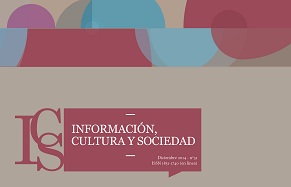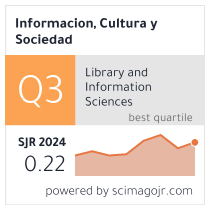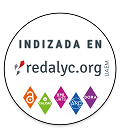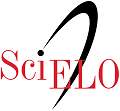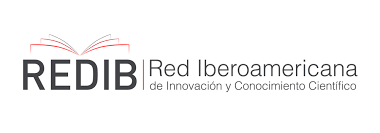Ixmati. The library as a laboratory
Abstract
This essay examines the relevance of the public library as a physical space within the context of the digital age. Given the predictions of its little relevance, the essay emphasizes the role of the agents or actors of the library project as the main mission of this institution aimed at the development of communities. The metaphor of the library as a laboratory is supported by the exercise of human libraries as the opposite extreme of the traditional version of a repository. The diversity and constant change of symbolic structures, including libraries, lead to a deterritorialization of their borders in a cartographic figuration that addresses their nomadic character as an expression of their critical and creative power in the field of political construction of knowledge. ARK CAICYT: http://id.caicyt.gov.ar/ark:/s18511740/oqay9tgz5Downloads
References
Arendt, Hannah. 1998. The Human Condition. Chicago: The University of Chicago Press.
Avedoy, Teresa. 2021. Manifiesto poético-político por la investigación de-en la biblioteca pública. Ciudad de México: Tragaluz
Bourdieu, Pierre. 2011. Capital cultural, escuela y espacio. México: Siglo XXI.
Braidotti, Rosi. 2011. Nomadic subjects: embodiment and sexual difference in contemporary feminist theory. New York: Columbia University Press. (Gender and Culture Series).
Braidotti, Rosi. 2012. Nomadic Theory. Nomadic theory: the portable Rosi Braidotti Gender and Culture. New York: Columbia University Press.
Braidotti, Rosi. 2013. Lo Posthumano. Barcelona: Gedisa Editorial.
Bruner, Jerome. 2004. Realidad mental y mundos posibles: Los actos de la imaginación que dan sentido a la experiencia. Barcelona: Gedisa.
Centro Iberoamericano de Desarrollo Estratégico Urbano. CIDEU. 2020. Parques Biblioteca. <https://www.cideu.org/proyecto/parques-biblioteca/> [Consulta: 1 julio 2024].
Epstein, Lourdes. 2019a. Una biblioteca de cuerpos. En XIX Congreso Nacional de Bibliotecas Públicas. (25 al 27 septiembre 2019: Ciudad de México). Dirección General de Bibliotecas. Secretaría de Cultura. <https://www.youtube.com/watch?v=aeWir7lyZ-U> [Consulta: 1 julio 2024].
Epstein, Lourdes. 2019b. Cómo hacer una biblioteca humana. La Aventura de Aprender. Madrid: Instituto Nacional de Tecnologías Educativas y de Formación del Profesorado (INTEF). Ministerio de Educación y Formación Profesional. <https://laaventuradeaprender.intef.es/proyectos_colab/como-hacer-una-biblioteca-humana/> [Consulta: 1 julio 2024].
Ganz, Marshall. 2018. Organizing: People, Power, Change. Organizing Notes. Leadership, Organizing, Action. Cambridge: John F. Kennedy School of Government. Harvard University.
Hall, Richard. 2020. The Hopeless University: Intellectual Work at the End of the End of History. En Postdigital Science and Education. Vol. 2, 830–848. <https://doi.org/10.1007/s42438-020-00158-9>.
Hallman, Shamichael. 2020. Reimagining the Public Library to Reconnect the Community. (17 marzo 2020). TEDx Talks. [Video]. YouTube. <https://www.ted.com/talks/shamichael_hallman_reimagining_the_public_library_to_reconnect_the_community_jan_2020?subtitle=en&lng=es&geo=es> [Consulta: 10 junio 2024].
Harari, Yuval Noah. 2024. Nexus. Barcelona: Penguin Random House Grupo Editorial.
Haraway, Donna. 1992. The Promises of Monsters: A Regenerative Politics for Inappropriate/d Others. En Lawrence Grossberg, Cary Nelson y Ann Treichler, eds. Cultural Studies. New York: Routledge.
Harding, Sandra. 2004. A Socially Relevant Philosophy of Science? Resources from Standpoint Theory’s Controversiality. En Hypatia. Journal of Feminist Philosophy. Vol. 19, no. 1, 25-47.
Jaramillo, Orlanda, Mónica Montoya, Claudia Vélez y Daniel Moncada. 2005. La biblioteca pública: una mirada desde su génesis y desarrollo. Antioquia: Grupo de Investigación en Biblioteca Pública. Escuela Interamericana de Bibliotecología. Universidad de Antioquia.
Kracauer, Siegfried. 2008. La fotografía y otros ensayos: El ornamento de la masa. Barcelona: Gedisa.
Lafuente, Antonio. 2022. Itinerarios comunes: Laboratorios ciudadanos y cultura experimental. Madrid: Ned Ediciones.
Lankes, R. David. 2011. The Atlas of New Librarianship. Cambridge: MIT Press.
Lankes, R. David. 2023. The Vital Role of Libraries and Democracy Needs Protection. En Clip de SEDIC, Revista de la Sociedad Española de Documentación e Información Científica. No. 87, 1-11. <https://doi.org/10.47251/clip.n87.112>
Levinas, Emmanuel. 1998. La huella del otro. México: Taurus.
López, Óscar. 2018. Significados y representaciones de la minga para el pueblo indígena Pastos de Colombia. En Psicoperspectivas. Vol. 17, no. 3, 1-13.
<http://dx.doi.org/10.5027/psicoperspectivas-vol17-issue3-fulltext-1353>
Manguel, Alberto. 2017. La biblioteca de noche. Madrid: Alianza Editorial.
Naylor, Annemarie. 2015. Prototyping the Library of the Future – Today. TEDx Talks. [Video]. YouTube. 27 de marzo 2015. <https://www.youtube.com/watch?v=14agqyV4ySU>. [Consulta: 5 junio 2024].
Reed, P. J. y J. L. Grigsby. 2006. Kurt Vonnegut. Magill’s Survey of American Literature. Ed. Rev. p. 1-14.
Schnapp, Jeffrey. 2011. Knowledge Design. En Conferencia de Disciplinas Emergentes. (febrero 2011: Houston). Houston: Universidad Rice. <http://jeffreyschnapp.com/wp-content/uploads/2011/09/Knowledge-Design.pdf> [Consulta: 5 junio 2024].
Schnapp, Jeffrey. 2015. The Library Beyond The Book. Serious Science. [Video]. YouTube. 29 de septiembre 2015. <https://www.youtube.com/watch?v=c_l45lGeFRE&t=12s>. [Consulta: 10 junio 2024].
Schnapp, Jeffrey y Matthew Battles. 2014. The Library Beyond the Book. China: MetaLABprojects. Harvard University.
Sheldrake, Merlin. 2020. Entangled Life. New York. Random House Publishing Group.
Sierra, Jeimmy. 2023. Medellín, una ciudad transformada 30 años después de la muerte de Pablo Escobar. Medellín: Agencia EFE. <https://efe.com/mundo/2023-12-03/medellin-una-ciudad-transformada-30-anos-despues-de-la-muerte-de-pablo-escobar/>. [Consulta: 1 julio 2024].
Sen, Amartya. 2000. Development as Freedom. New York: Anchor Books.
Authors publishing in this journal acknowledge the conditions below:
- Authors retain the copyright of their work while they transfer the right of the first publishing to the journal, under the Creative Commons Attribution-ShareAlike 4.0 International (CC BY-SA 4.0) Licence, which allows third parties to reproduce them under the condition that express mention is given to the author and to its original publication in the journal.
- Authors may enter into other contractual and independent arrangements for the non-exclusive distribution of the version of the article published in this journal (for instance, it can be published in an institutional repository or in a book). In any case, an express mention should be given to its first publication in the journal.
- It is permitted and encouraged to publish online the articles (for example, on institutional or personal pages).
